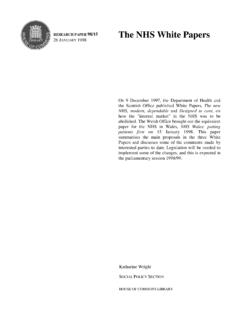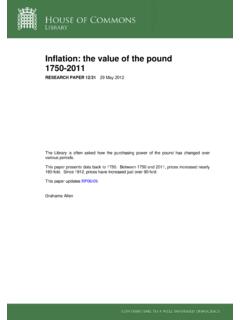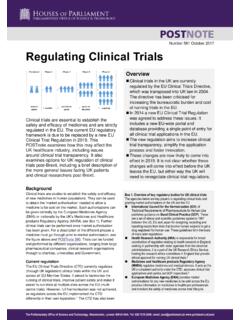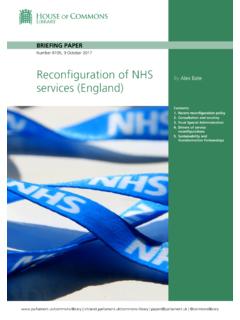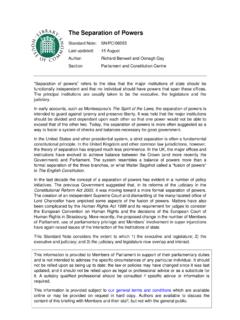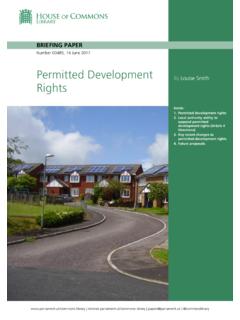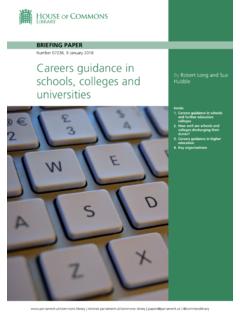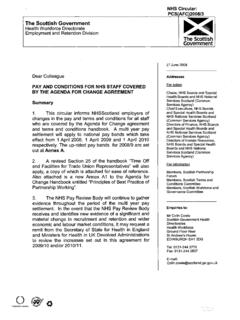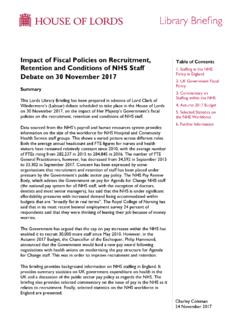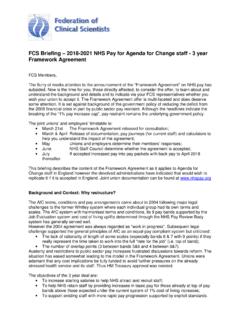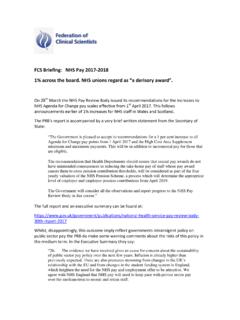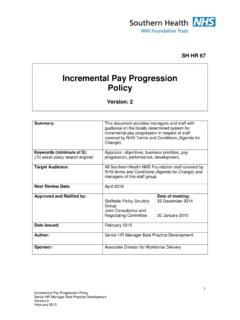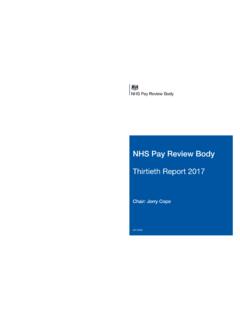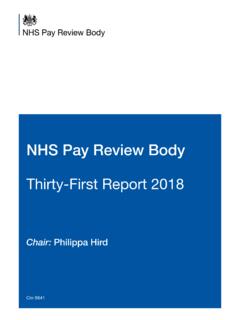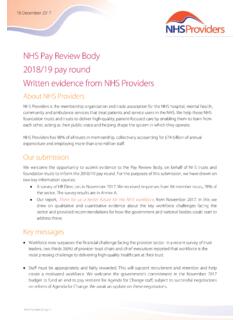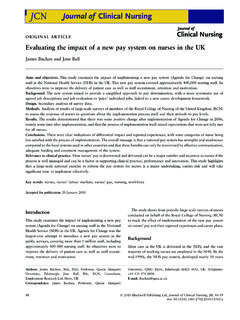Transcription of Regional pay in the NHS
1 Regional pay in the NHS Standard Note: SN/SP/6461 Last updated: 5 November 2012 Author: Thomas Powell Section Social Policy This standard note provides background to the House of Commons Opposition-day debate on Regional pay in the NHS on 7 November 2012. The note is divided into three sections: section one sets out some general information on the current national pay framework within the NHS; section two covers the Government s wider approach to Regional or market facing pay in the public sector, and section three covers its specific proposals for the NHS. A selection of press and parliamentary material on Regional pay in the NHS can be found in a Library debate pack prepared for the debate on 7 November, of which this note forms a part. The debate pack includes a number of articles concerning Regional pay proposals from a consortia of NHS employers in south west England.
2 The pack also provides links to further reading, including recent reports and articles on Regional pay in the public and private sectors. There was a previous Opposition-day debate on Regional pay which took place on 20 June 2012, Hansard for this debate can be accessed here. This information is provided to Members of Parliament in support of their parliamentary duties and is not intended to address the specific circumstances of any particular individual. It should not be relied upon as being up to date; the law or policies may have changed since it was last updated; and it should not be relied upon as legal or professional advice or as a substitute for it. A suitably qualified professional should be consulted if specific advice or information is required. This information is provided subject to our general terms and conditions which are available online or may be provided on request in hard copy.
3 Authors are available to discuss the content of this briefing with Members and their staff, but not with the general public. Contents 1 nhs pay and remuneration 2 2 Regional pay in the public sector Background 3 3 The nhs pay review body s local pay review 3 1 nhs pay and remuneration Pay for the vast majority of NHS staff is based upon the recommendations of two independent pay review bodies: the review body on Doctors' and Dentists' Remuneration and the nhs pay review body (NHSPRB), which covers nurses and other healthcare professionals, as well as administrative and ancillary staff (senior NHS managers are covered by the Senior Salaries review body (SSRB)). The review body on Doctors' and Dentists' Remuneration was appointed in 1971 and makes recommendations on the remuneration of doctors and dentists taking any part in the NHS across the UK. The NHSPRB makes recommendations on the remuneration of all NHS staff paid under Agenda for Change in England, and for non-medical staff employed in the NHS across the UK (comprising just under million workers).
4 1 The review bodies make recommendations to the Prime Minister, the Secretary of State for Health, and Ministers of the Scottish Government, the Welsh Assembly Government and the Northern Ireland Executive. They receive evidence on pay and related issues from the Governments, NHS Employers and staff organisations and also conduct their own research. The NHSPRB was originally known as the review body for Nurses and Allied Health Professions (NAPRB) and was set up in 1983 to advise the Government on the pay of NHS nursing staff, midwives and health visitors. Following the introduction of Agenda for Change (AfC) in late 2004, the review body 's remit was extended to cover allied health professions, and extended again in 2007 to cover the remaining NHS staff not within its remit who were also paid under the Agenda for Change pay system (in July 2007 the review body was renamed the nhs pay review body to reflect these changes).
5 Agenda for Change does make some provision for market-facing zonal pay differentiation, with additional high cost area supplements (HCAS) for staff working in London. Individual employers also have the flexibility to vary the pay they offer through the application of local Recruitment and Retention Premium (RRPs), again within the current AfC framework. NHS Foundation Trusts (FTs) have the authority to renegotiate their own terms and conditions outside of national frameworks (subject to appropriate consultation and agreement to vary the employment contracts of their employees). Although in practice few FTs choose to do so, this may change as financial pressures grow. The degree to which non-FT NHS bodies are able to act is dependent on their status; for example; non-foundation NHS hospital trusts may 1 Information taken from Office for Manpower Economics (OME) website. For details of the NHSPRB Terms of Reference, click here; review bodies are composed of members from a variety of professional, academic and business backgrounds for details of review body Members, click here.
6 2 be restricted to acting via guidelines agreed through the NHS Staff Council and with the explicit agreement of their Strategic Health 2 Regional pay in the public sector Background The Government is examining whether public sector pay can be made more responsive to local pay rates across the UK. In November 2011 the Chancellor s Autumn Statement highlighted Government concerns that inappropriate differentials between public and private sector wages could hurt private sector businesses and announced that the Government was asking independent pay review bodies to consider how public sector pay can be made more responsive to local labour The current focus of this work is the civil service and the public sector workforces covered by the pay review bodies for prison staff, schoolteachers (in England and Wales), and NHS staff (excluding doctors and dentists) in Links to further information on Regional pay, including current practice in the public and private sectors, can be found in the Library debate pack for the House of Commons Opposition-day debate on Regional pay in the NHS on 7 November 2012.
7 3 The nhs pay review body s local pay review The Chancellor wrote to the nhs pay review body (NHSPRB) with regard to Agenda for Change staff, and to the Senior Salary review body (SSRB) with regard to senior civil servants and NHS managers, on 7 December 2011. He asked them to consider how to make pay more market-facing and listed a number of factors they should take into account, requesting that they submit their initial findings by 17 July 2012. The Secretary of State for Health wrote to the NHSPRB and SSRB on 23 December 2011 to confirm their remit and ask them to consider a number of additional The review bodies market based local pay reports have now been submitted to the Government and Ministers have said they intend to publish these reports and respond to their recommendations in due course. The Department of Health s evidence to the NHSPRB local pay review was published in April 2012.
8 In summary, the DH view is that there is a prima facie case for the introduction of more market facing pay, using the existing AfC framework: NHS allocation processes and the tariffs for Payment by Results (PBR) that are used to fund most clinical services already take account of geographical variations of staffing costs. Current rates of pay in the NHS do vary geographically, but significantly less so than the pay of comparable staff in the private sector. The introduction of more sensitive Market Facing Pay would therefore enable more efficient and effective use of NHS funds. Moreover, the DH believes that Market Facing Pay could be achieved fairly, simply, safely and effectively through modest changes to the existing AfC pay framework with the addition of a number of new High Cost Area Supplements (HCAS) zones (with the 2 Further information available from The NHS Employers organisation submission to the nhs pay review body on market facing pay, dated March 2012 3 HM Treasury, Autumn Statement 2011 (Cm 8231, November 2011) 4 OME, Call for evidence on how to make pay more market-facing in local areas for certain groups of public sector workers.)
9 This initiative affects only workers whose terms and conditions are set by the UK government; the Scottish and Welsh governments have expressed concerns about more localised public sector pay. 5 Letters from the Chancellor and Health Secretary to the pay review Bodies about market-based local pay, December 2011. 3 4 geography and value of these zones informed by staff Market Forces Factors (sMFFs)), whilst retaining the scope for existing employer flexibilities such as Recruitment and Retention Premia (RRPs) to deal with local and staff group specific issues. 6 The DH proposes a dual approach of additional centralised pay differentiation and supporting the use of local flexibilities, to allow organisations to reflect their local labour market. The July 2010 White Paper, Equity and Excellence, Liberating the NHS, set the Government s view that pay decisions should be led by individual healthcare employers rather than imposed by the Government, and it reiterated that in the future all NHS employers will have the rights, as FTs have now, to determine pay for their own staff.
10 However, it also stated that many providers would want to continue to use national contracts as a basis for local terms and conditions and that the DH is committed to working with NHS employers and trade unions to explore appropriate arrangements for setting pay in the longer term. This work is being undertaken primarily through the NHS Staff Council. A copy of HM Treasury s evidence to the pay review bodies review of market facing pay can be accessed here7 and the NHS Employers organisation submission to the NHSPRB8, dated March 2012, is available here. 6 DH, NHSPRB - Market Facing pay review , April 2012 7 HMT, Chancellor's letter to pay review Bodies & Govt Economic Evidence, March 2012 8 NHS Employers submission to the NHSPRB review of market facing pay, March 2012. Other responses can be found here.


